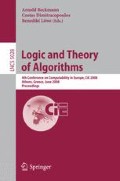Abstract
Dynamical systems allow to modelize various phenomena or processes by only describing their local behaviour. It is however useful to understand the behaviour in a more global way. Checking the reachability of a point for example is a fundamental problem. In this document we will show that this problem that is undecidable in the general case is in fact decidable for a natural class of continuous-time dynamical systems: linear systems. For this, we will use results from the algebraic numbers theory such as Gelfond-Schneider’s theorem.
Access this chapter
Tax calculation will be finalised at checkout
Purchases are for personal use only
Preview
Unable to display preview. Download preview PDF.
References
Hirsch, M.W., Smale, S., Devaney, R.: Differential Equations, Dynamical Systems, and an Introduction to Chaos. Elsevier Academic Press (2003)
Murray, J.D.: Mathematical Biology, 2nd edn. Biomathematics, vol. 19. Springer, Berlin (1993)
Lorenz, E.N.: Deterministic non-periodic flow. Journal of the Atmospheric Sciences 20, 130–141 (1963)
Graça, D.S., Campagnolo, M.L., Buescu, J.: Robust simulations of Turing machines with analytic maps and flows. In: Cooper, S.B., Löwe, B., Torenvliet, L. (eds.) CiE 2005. LNCS, vol. 3526, pp. 169–179. Springer, Heidelberg (2005)
Mignotte, M.: Suites récurrentes linéaires. Séminaire Delange-Pisot-Poitou. Théorie des nombres 15, G14–1–G14–9 (1974)
Berstel, J., Mignotte, M.: Deux propriétés décidables des suites récurrentes linéaires. Bulletin de la Société Mathématique de France 104, 175–184 (1976)
Halava, V., Harju, T., Hirvensalo, M., Karhumäki, J.: Skolem’s problem - on the border between decidability and undecidability. Technical Report 683, Turku Center for Computer Science (2005)
Blondel, V., Portier, N.: The presence of a zero in an integer linear recurrent sequence is NP-hard to decide. Linear algebra and its Applications 351–352, 91–98 (2002)
Bournez, O.: Complexité algorithmique des systèmes dynamiques continus et hybrides. PhD thesis, École Normale Supérieure de Lyon (1999)
Asarin, E., Maler, O., Pnueli, A.: Reachability analysis of dynamical systems having piecewise-constant derivatives. Theoretical Computer Science 138, 35–65 (1995)
Asarin, E., Schneider, G.: Widening the boundary between decidable and undecidable hybrid systems. In: Brim, L., Jančar, P., Křetínský, M., Kucera, A. (eds.) CONCUR 2002. LNCS, vol. 2421, pp. 193–208. Springer, Heidelberg (2002)
Asarin, E., Schneider, G., Yovine, S.: On the decidability of the reachability problem for planar differential inclusions. In: Di Benedetto, M.D., Sangiovanni-Vincentelli, A.L. (eds.) HSCC 2001. LNCS, vol. 2034, pp. 89–104. Springer, Heidelberg (2001)
Blondel, V., Tsitsiklis, J.N.: A survey of computational complexity results in systems and control. Automatica 36(9), 1249–1274 (2000)
Kannan, R., Lipton, R.J.: Polynomial-time algorithm for the orbit problem. Journal of the ACM 33(4), 808–821 (1986)
Hirsch, M.W., Smale, S.: Differential Equations, Dynamical Systems, and Linear Algebra. Academic Press (1974)
Mignotte, M.: An inequality about factors of polynomials. Mathematics of Computation 28(128), 1153–1157 (1974)
Bostan, A.: Algorithmique efficace pour des opérations de base en calcul formel. PhD thesis, École polytechnique (2003)
Brawley, J.V., Carlitz, L.: Irreducibles and the composed product for polynomials over a finite field. Discrete Mathematics 65(2), 115–139 (1987)
Baker, A.: Transcendental Number Theory. Cambridge University Press (1990)
Gelfond, A.O.: Transcendental and Algebraic Numbers. Dover Publications (2003)
Lelong-Ferrand, J., Arnaudiès, J.M.: Cours de mathématiques, tome 1: algèbre. Dunod (1971)
Author information
Authors and Affiliations
Editor information
Rights and permissions
Copyright information
© 2008 Springer-Verlag Berlin Heidelberg
About this paper
Cite this paper
Hainry, E. (2008). Reachability in Linear Dynamical Systems. In: Beckmann, A., Dimitracopoulos, C., Löwe, B. (eds) Logic and Theory of Algorithms. CiE 2008. Lecture Notes in Computer Science, vol 5028. Springer, Berlin, Heidelberg. https://doi.org/10.1007/978-3-540-69407-6_28
Download citation
DOI: https://doi.org/10.1007/978-3-540-69407-6_28
Publisher Name: Springer, Berlin, Heidelberg
Print ISBN: 978-3-540-69405-2
Online ISBN: 978-3-540-69407-6
eBook Packages: Computer ScienceComputer Science (R0)

